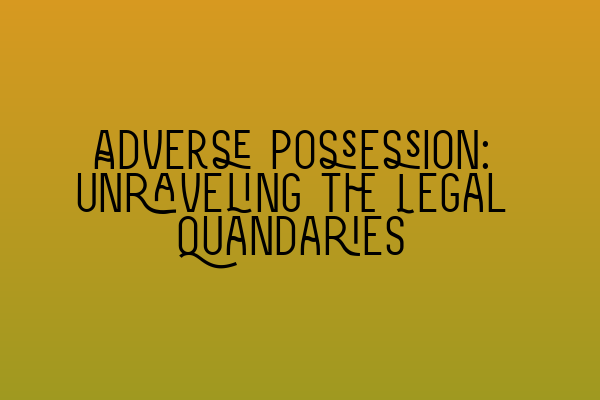Adverse Possession: Unraveling the Legal Quandaries
Adverse possession is a legal concept that has fascinated property owners, solicitors, and land law enthusiasts for centuries. It involves the acquisition of ownership rights to land by someone who does not have a legal title to the property. This intriguing legal principle raises numerous questions and challenges, making it an area of interest for legal practitioners and individuals alike.
In this blog post, we will explore the intricacies of adverse possession, delving into its definition, requirements, and potential implications. Whether you are a property owner seeking to protect your rights or a legal professional intrigued by the complexities of land law, this article aims to provide valuable insights into this captivating legal quandary.
Defining Adverse Possession
Adverse possession refers to the occupation and use of another person’s land without the permission of the legal owner. The doctrine is based on the idea that if someone openly possesses and maintains control over a piece of property for a certain period of time, they should be granted legal ownership. The person claiming adverse possession must demonstrate several key elements to successfully acquire the land in question.
Requirements for Adverse Possession
1. Actual Possession: The claimant must physically occupy and control the property being claimed. Mere casual use or occasional visits may not be sufficient to establish adverse possession. The possession must be exclusive, continuous, and without the permission of the legal owner.
2. Open and Notorious: The claimant’s possession must be open and obvious to anyone who may have an interest in the property. It should be clear to the legal owner that someone else is occupying the land without their permission. This requirement prevents secretive or hidden occupancy from leading to adverse possession.
3. Hostile: The term “hostile” in this context does not necessarily imply animosity or ill will. It simply means that the possession is without the owner’s consent. The claimant must possess the land with an intent to claim ownership, disregarding the legal owner’s rights.
4. Exclusive: The possession must be exclusive, meaning that the claimant has sole control over the property. Shared or joint possession with the legal owner would not qualify as adverse possession.
5. Continuous: The possession must be continuous throughout the statutory period required by law. The length of time required for adverse possession varies depending on the jurisdiction, but it is usually around 10-20 years. If the claimant ceases possession during this period, the clock resets, and they will need to start again.
Implications of Adverse Possession
Adverse possession can have significant implications for both the legal owner and the claimant. For the legal owner, it can result in the loss of their property rights if they fail to take action to challenge the claim of adverse possession. On the other hand, for the claimant, successful adverse possession can lead to acquiring legal ownership of the property.
However, it is important to note that adverse possession is a complex legal doctrine, and the outcome of a claim is not always guaranteed. Legal owners may challenge adverse possession claims by asserting their rights through legal action and providing evidence that refutes the claimant’s case.
Furthermore, adverse possession laws may vary depending on the jurisdiction, and the specific requirements and procedures involved can be intricate. Seeking professional legal advice from experienced solicitors specializing in property law is essential for both legal owners and claimants wishing to navigate the complexities of adverse possession.
The Role of Solicitors in Adverse Possession Cases
Solicitors play a crucial role in adverse possession cases, representing the interests of their clients and providing expert legal guidance. As legal professionals, solicitors possess the knowledge and understanding of the intricacies of land law, ensuring their clients’ rights are protected.
In adverse possession cases, solicitors can assist their clients in various ways:
1. Advice and Consultation: Solicitors can assess the viability of an adverse possession claim, providing clients with personalized advice based on their specific circumstances. They can explain the legal requirements, potential risks, and possible outcomes to help clients make informed decisions.
2. Evidence Gathering: Solicitors can assist clients in gathering and presenting the necessary evidence to support their adverse possession claim. This may include documentation, witness statements, and expert opinions to strengthen their case.
3. Negotiation and Mediation: Solicitors can engage in negotiation and mediation with the legal owner’s representatives to explore potential resolutions. This can help avoid lengthy and costly court proceedings while still protecting their client’s interests.
4. Court Representation: If the dispute reaches court, solicitors can represent their clients, presenting their case and advocating for their rights during the legal proceedings. They possess the necessary legal knowledge and expertise to navigate the complexities of the courtroom.
Overall, solicitors play a vital role in ensuring that the adversarial possession process is conducted in accordance with the law, protecting the rights and interests of their clients.
At SQE Property Law & Land Law, our team of experienced solicitors specializes in property law matters, including adverse possession. We understand the intricacies involved in these complex cases and are dedicated to providing expert legal representation and guidance to our clients.
If you are facing an adverse possession dispute or have any questions regarding property law, contact SQE Property Law & Land Law today. We are here to help you navigate through the legal complexities and protect your rights.
We also invite you to explore our related articles for further insights into various aspects of contract law and property transactions:
1. Misrepresentation in Contracts: Unveiling Deceptive Practices
2. SQE Contract Law: Analyzing Landmark Cases and Influential Judicial Decisions
3. Understanding Contractual Capacity: Rights and Limitations
4. Interactive SQE Mock Tests for Contract Law: Test Your Knowledge
5. Join Our SQE Contract Law Webinars: Expert Insights and Guidance
Contact SQE Property Law & Land Law today to schedule a consultation or to learn more about our legal services. With our expertise and dedication, we are here to guide you through any property law challenges you may face.
